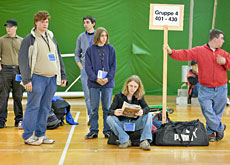Inquiry continues into fatal Jungfrau accident

Military investigators have called on snow and avalanche experts to help determine the cause of the fatal mountaineering accident that killed six Swiss soldiers.
A religious ceremony for the sixth victim of the July 12 accident – Switzerland’s worst military accident for 15 years – also took place in Saas-Grund in canton Valais on Friday.
The accident happened at 10am local time as the troops were taking part in an exercise on the southwest flank of the Jungfrau peak in the Bernese Oberland region. Eight men were rescued unharmed.
The military investigation into the cause of the tragedy is continuing. The enquiry will hope to establish whether the accident was caused by an avalanche, as initially thought, or whether one of the six soldiers slipped and dragged the others over a huge drop into the valley below. This was the testimony made by one of the eight survivors on Tuesday.
Interviews with the survivors and other witnesses, and information about snow conditions are due to be completed next week. But a result is not expected until October.
The army has asked the Federal Institute for Snow and Avalanche Research in Davos to help clarify weather conditions at the time of the accident. Researchers will also help determine the most appropriate route up the mountain and the most likely accident scenario.
“The institute will base its decision on information collected several hours after the accident,” said army spokesman Martin Immenhauser, adding that their report would take three to four weeks to finalise.
Call for restraint
In a separate development, the Swiss Mountain Guide Association on Friday sent a email to its members asking them for restraint when talking publicly about the drama.
The association advised them “not to express a personal verdict and to refrain from any premature accusation”.
This follows doubts raised by mountain experts that have appeared in the Swiss press almost on a daily basis as to whether or not the accident was caused by an avalanche, and if it had been wise to undertake the climb given the conditions.
According to local guides, it had snowed for several days prior to their climb and there was 40-60cm of fresh snow.
At a news conference after Tuesday’s memorial service, one of the eight survivors said he had noticed nothing of an avalanche and had slipped because the climber in front had fallen on him.
All the rope teams then fell, but the two at the rear managed to avoid the sheer drop that killed the six soldiers from western Switzerland.
The testimony contradicted earlier reports which said the soldiers were swept away by an avalanche. This has led to harsh criticism in the Swiss media, which questioned the army’s decision to let the expedition go ahead despite a high avalanche risk.
Georg Flepp, the mountain guide association’s president, told Berner Zeitung that he wasn’t trying to silence anyone.
“In general guides should show restraint in their comments over accidents when they themselves were not there,” the association stated.
“Guides directly involved in the Jungfrau accident have been requested not to talk in public,” said Flepp. “They will only harm themselves.”
swissinfo, with agencies
The Swiss Army has confirmed that 24 army personnel stayed in the Mönchsjoch hut overnight before mountain tours last Thursday in the Bernese Oberland.
Fifteen of them left on a trip up the Jungfrau mountain, with one of them breaking the tour at the Jungfrau saddle because he felt unwell.
Seven others went, as planned, up the Mönch mountain, which is located between the Jungfrau and the renowned Eiger.
The remaining two stayed in the Mönchsjoch hut because they were also not feeling well.
The victims were all part of the Mountain Specialists Division 1 in the Swiss militia army.
To be accepted into the recruit school in Andermatt, members have to fulfil two conditions: completion of a special group leadership course in one of the two fields: ski touring or mountaineering; and obtain marks good to very good in the sport exams that are part of the 3-day conscription to the army.
The main emphasis of training is on avalanche duties, mountain rescue techniques, survival in the mountains, and carrying out redeployment moves in the mountains.
Members of the unit are also taught to act as advisers and trainers.
The unit is expected to be ready to be deployed and operational within 9 hours.

In compliance with the JTI standards
More: SWI swissinfo.ch certified by the Journalism Trust Initiative













You can find an overview of ongoing debates with our journalists here . Please join us!
If you want to start a conversation about a topic raised in this article or want to report factual errors, email us at english@swissinfo.ch.